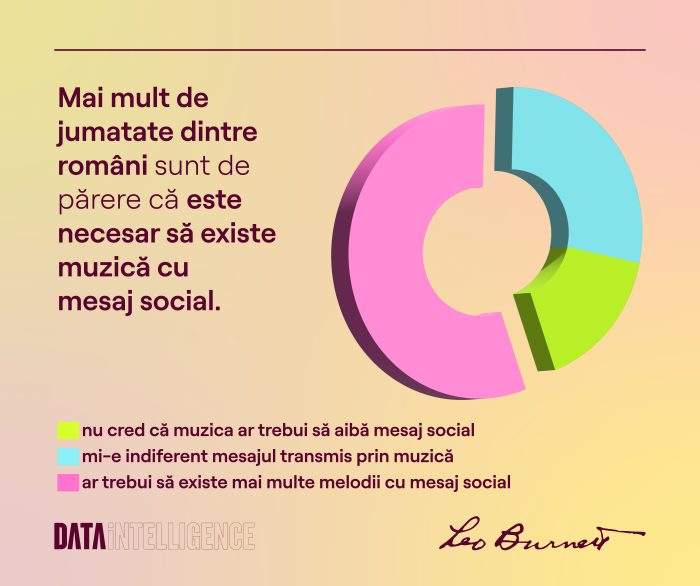Two weeks ago, a song was released that was expected to divide Romania in two, according to voices and online publications attempting to explain the divergences among people provoked by Erika Isac’s song – Macarena.
Through this social study, Leo Burnett Bucharest and Data Intelligence from Publicis Groupe Romania aimed to bring more clarity to the public discourse by validating the conclusions drawn empirically.
What do people actually think about Erika Isac’s song – Macarena?
Among Romanians who have listened to the song, 46% appreciate it entirely, considering its message powerful and deserving more attention precisely because it raises an important issue – the status of women in society and the aggressions directed towards them.
At the same time, 35% of respondents appreciate the message but dislike the vulgar language, the music video, or the musical genre of the song.
According to the Global Web Index, music ranks first in the interests of Romanians, and over half of the respondents believe that there should be music with a social message.
Differences in perception between men and women
86% of Romanian women consider cases of physical, psychological, or emotional aggression against women to be frequent.
The empirical conclusion that can be drawn from a single glance at the comments is confirmed by this social study. Women resonate with the song’s message precisely because they have experienced the lyrics first-hand. 7 out of 10 women declare that they have been victims or have friends in their circle who have been victims of some form of aggression.
On the other hand, 1 in 3 men believe that Erika Isac’s song – Macarena is a demonstration of victimization of women, and its message is not relevant to our society.
Generation Z – a lesson in social empathy
As expected, the results identified among respondents from Generation Z (18-24 years old) stand out. 62% of them resonate with Erika’s song and message.
Through the verse “Girl, let me share your live location in case of anything,” Erika highlights a behaviour found particularly among young women, which they resort to when they do not feel entirely safe.
6 out of 10 Romanian women state that the song made them feel understood (almost 2x more than the rest of the generations).
Moreover, over half of young women believe that the song gave voice to thoughts that they or their friends have not been able to express until now.
Through her lyrics, Erika not only articulates the injustices and abuses felt by so many women but also gives the courage needed for other young women (44%) to speak about the problems they have faced. This movement is particularly found on the Threads platform, where several women share stories about situations in which they felt in danger or were physically, emotionally, or verbally assaulted.
In the TikTok Influencers Index, a data tool analysing the communication of over 700 content creators, Erika Isac’s song was the most used sound from February 13 to 26, and the associated TikToks gathered over 7.5 million views.
Erika Isac’s song – Macarena garnered over 3.7 million views on YouTube and was listened to by half of the study respondents. This gives us an insight into the impact that the message of the lyrics has left on society.
On Google Trends, interest in the two keywords – Erika Isac and Macarena – reached its peak on February 20. Two weeks after its release, the subject is still relevant.
We are left with only one question. What can we do to make things a little better for millions of women?
Methodology: CAWI study conducted from February 23 to 26, on a nationally representative sample of 600 respondents, aged over 18.
 All Publicis Groupe Romania proprietary data tools in one place.
All Publicis Groupe Romania proprietary data tools in one place.Discover the power of our tools and feel free to get in touch.











